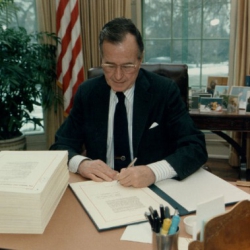Today is the 22nd anniversary of the Professional and Amateur Sports Protection Act being signed into law by President George H.W. Bush. Though the law was passed just a year after the end of the Cold War, the PASPA is a major topic of discussion in the American gambling industry in 2014.
History of the PASPA
The PASPA was the law cited by U.S. District Judge Michael Shipp last Friday, when he granted a temporary restraining order to the U.S. professional sports leagues and the NCAA. Judge Shipp’s restraining order kept Monmouth Park in New Jersey from opening a sportsbook last weekend.
The Professional and Amateur Sports Protection Act was drafted at the behest of the NFL, Major League Baseball, the NBA, NHL, and NCAA. The major American sports associations sent an army of lobbyists to Washington D.C. to see the passage of the law. They believed unfettered sports betting across the American landscape would damage the popularity of their sports.
1991 Bettman and Moyer Quotes
Gary Bettman, the longtime NHL commissioner and then-NBA Vice President, said in 1991 USA Today articles, “[I]f there [were] widespread legal gambling, [the leagues would] be less popular, because the environment of the game will change.”
Jay Moyer, at the time the NFL Vice President, told USA Today that sports gambling was “like a cancer”, because the sports wagers would diminish the significance of sport.
Exemption for Gambling States
Despite that stance, the PASPA allowed four states to open sportsbooks: Nevada, Montana, Delaware, and Oregon. Lobbyists for those four states fought hard to protect those states’ traditional rights to allow sports betting. Their stance forced a compromise, allowing such states to grandfather in their bookmaker businesses to the new law. The PASPA says that states could maintain sportsbooks if “such (a) scheme was authorized by a statute as in effect on October 2, 1991; and…was conducted in that State or other governmental entity at any time during the period beginning September 1, 1989, and ending October 2, 1991.”
With such language in the law, Nevada and its fellow gaming states were given a special exemption for betting on sports games. States like New Jersey were not allowed to sign on to the PASPA, a move which has damaged the Atlantic City casino industry more than any other. That is why New Jersey Governor Chris Christie seeks to legalize sports betting in his state, to allow Atlantic City casinos and New Jersey racetracks like Monmouth Park to collect extra revenues as the only major sportsbooks on the east coast.
New Jersey Tries to Legalize Gambling
New Jersey argues its sportsbooks, which would be on a much smaller scale than the Las Vegas Strip casinos’ sportsbooks, simply could not harm the pro games the way the leagues suggest it might. Furthermore, New Jersey sports betting proponents argue that the PASPA is simply unfair, because it restricts some states, while allowing others to make big profits by running virtual sports gambling monopolies.
U.S. Sports Since 1992
In the 22 years since President Bush signed the PASPA into law, legalized sports gambling has continued with federal approval–though in limited form. Over the years, few would argue that the U.S. sports leagues have been damaged by the operation of Las Vegas sportsbooks. The NFL is more popular than it’s ever been. Major League Baseball was facing a labor crisis in 1992 and saw major damage to the leagues when the World Series wasn’t played in 1994, due to work stoppage. Still, MLB is strong and healthy, with bigger TV contracts now than ever before. The NBA faced retrenchment in the wake of the Global Recession, but its new collective bargaining agreement is in place and teams are set to enter a new era of prosperity–the NBA is watched by many more people now than it was in 1992.
Of course, the NHL has entered a long period of decline during the Gary Bettman Era, but no one would suggest it was because of sports gambling. Too much expansion and seriosu labor issues killed the interest many U.S. television viewers had in hockey, so the NHL no longer has the big TV contracts it once had.
The NCAA might be more dominated by the big conferences than it’s ever been, but the oversight association for major college sports has bigger ratings and draws more revenues than ever before. With NCAA football set to begin its first season with a playoff bracket, fan interest has never been as great. NCAA basketball is going through a golden age, as March Madness is a pop culture phenomenon.

